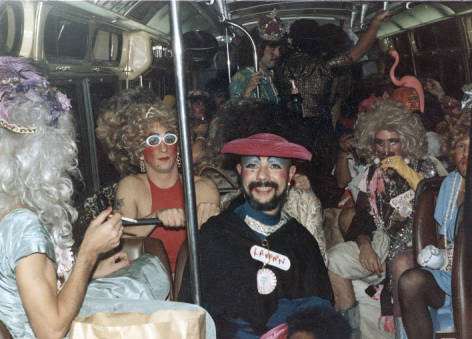
Bag Ladies on the Bus Tour in 1982. Possibly the nation’s first HIV/AIDS fundraising organization, the annual Bag Lady Bus Tour began in Indianapolis in 1981. Around Halloween about 70 men dressed in drag and boarded buses to travel from bar to bar soliciting money to fight AIDS. They were named because of their likeness to New York “bag ladies” who were described in an article as fun and campy with lots of “hutspah.” Digital Image 2009 Coby Palmer. All Rights Reserved.
The Indy Bag Ladies is a fundraising and activist organization working for the treatment and care of those with Acquired Immunodeficiency Syndrome (AIDS) in Indianapolis. The organization began as a fun Halloween bus tour of local gay bars in 1981. This bus tour was the inaugural event that led to an ongoing legacy of AIDS activism. Led by AIDS activists Coby Palmer, Ed Walsh, and Gary Johnson, this tour brought together a group of men from the Indianapolis gay community who dressed in “camp” drag. About 70 “ladies” toted large bags filled with costume changes as they hopped on and off three large charter busses.
In 1981, AIDS emerged as a new deadly disease, in cities across the country. Gay men were among the first to be diagnosed with AIDS, creating a lasting connection between the disease and gay communities. Palmer and other Bag Ladies decided to make a “frontal assault on ‘the plague’.” In October 1982, two of the original participants, Steve Willis and Ed Walsh began to use the bus tour, which became an annual tradition to fundraise for AIDS care and treatment for people of Indianapolis. In addition to their costumes, participants also carried empty bags to collect donations to build a “war chest” for the future.
The Indy Bag Ladies host a number of other fundraising events throughout the year. This includes shimmering Shamrocks, a Gospel Brunch, and drag shows. All money raised is given to the Gregory R. Powers Direct Emergency Financial Assistance (DEFA) Fund which helps those in need in the lesbian, gay, bisexual, transgender and queer or questioning (LGBTQ) communities, especially those with HIV and AIDS. Some of the DEFA fund is used to support the mission of the Health Foundation of Greater Indianapolis that aims to support HIV/AIDS health-related projects and organizations in Indianapolis.
In their 38-year history, the Bag Ladies have raised over $1 million for AIDS and LGBTQ charities. Each year, over 100 people join the bus tour, Bag Ladies and friends alike. The group publicizes their route so supporters can meet them at different stops along their tour. Beyond fundraising, the Bag Ladies have played their part in the creation of several different AIDS-related programs.
The Buddy House was a temporary housing program for people with AIDS. The house was established during the early years of the AIDS crisis, when no effective treatment existed and residents were expected to reside at the house until they died. The Indy Bag Ladies and friends provided the house itself, meals, furniture, and companionship to the residents. The housing program was short-lived due to fear the Bag Ladies would face legal problems because many residents took advantage of the situation.
The Buddy Support Program was established in 1985 through a combined effort by Darrell Arthur, an Indy Bag Lady, and Dr. Daniel Hicks, a psychiatrist from {Methodist Hospital}::EL in Indianapolis. This program trained unlicensed caregivers to aid people with AIDS physically and emotionally. Buddies participated in several days of training that included mental support for grief, the physical symptoms of AIDS, and more. This allowed them to be paired with a person with AIDS in the community who needed assistance. Many of the original buddies were also Indy Bag Ladies. The Damien Center later adopted this program.
Bag Lady Kenn King initiated the Nurse Safe Sexx campaign, which was an extremely successful grassroots HIV-education campaign. She provided education in a fun and engaging way.
The Indy Bag Ladies also have played an integral role in the creation of other LGBTQ or AIDS-related groups in Indianapolis. The Damien Center. established in 1987 as a care and treatment center for people with AIDS, opened through the efforts of the Indy Bag Ladies, the Episcopalian Church, and the Catholic Church.
Indy Bag Ladies were also involved in the creation of the Indiana AIDS Fund and the Indiana Youth Group , an LGBTQIA+ advocacy organization that provides basic needs, social programming, and safe social spaces for queer youth. They also continue to raise money and awareness about issues in the LGBTQ communities.

